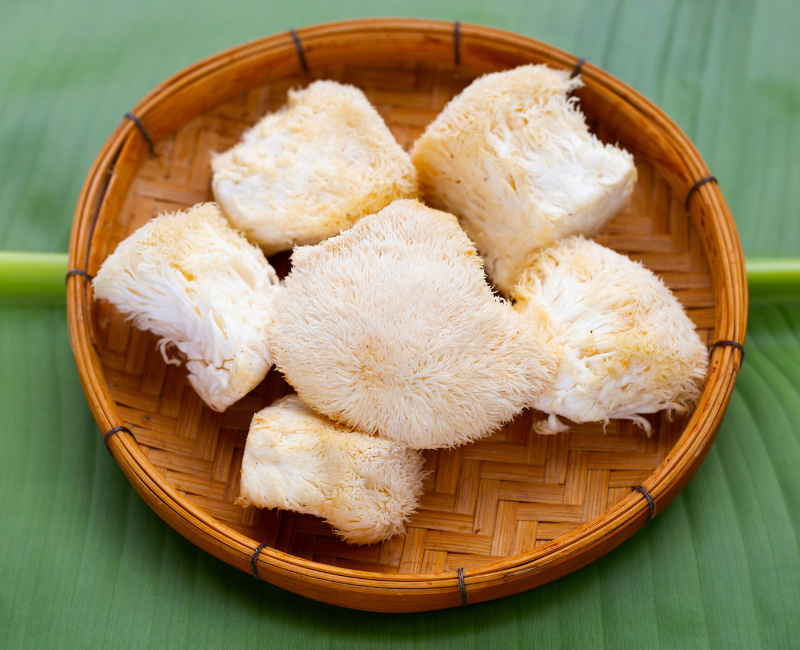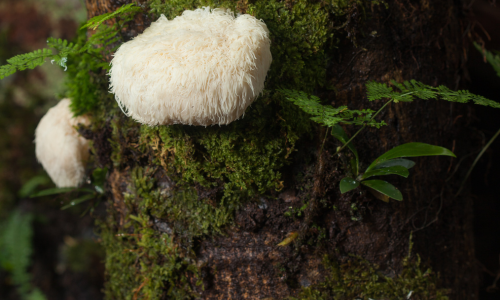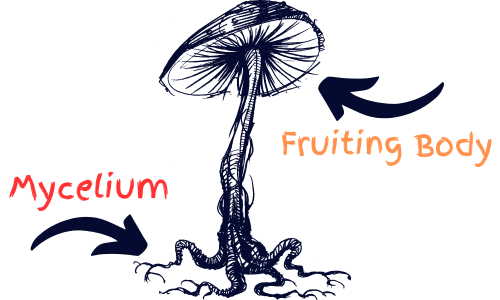
Ever had one of those days where your focus seems to be everywhere but where it needs to be? We’ve all been there. In our modern world, distractions are everywhere, and it can be a real challenge to keep our minds on task. But what if there was a natural way to help? This is where Lion’s Mane Mushroom comes into the picture. This unique fungus has been gaining attention for its potential to enhance cognitive abilities, particularly focus. In this blog post, we’ll explore the science behind Lion’s Mane Mushroom and its potential benefits for our brains. So, if you’re curious about natural methods to improve your focus or simply interested in the fascinating world of nootropics, stick around. This might be the information you’ve been looking for.
“Research suggests that Lion’s Mane mushroom can enhance focus by stimulating the production of Nerve Growth Factor.”
What is Lion’s Mane?

Lion’s Mane Mushroom, scientifically known as Hericium erinaceus, is a unique and somewhat rare fungus that stands out from the crowd with its distinctive appearance. Resembling a white, cascading waterfall or the mane of a lion, this mushroom is native to North America, Europe, and Asia. It thrives in hardwood forests, growing on dead or dying trees. Its rarity adds to its allure and underscores the value of its potential health benefits.
This mushroom isn’t just known for its striking looks. It’s been used for centuries in traditional Chinese medicine, revered for its medicinal properties. Lion’s Mane Mushroom is packed with antioxidants and beta-glucan polysaccharides, which are believed to have numerous health benefits.
But it’s in the realm of cognitive and mental health, where Lion’s Mane truly shines. It’s one of the few mushrooms known to support brain health. Recent research has brought this humble fungus into the limelight for its potential to enhance cognitive functions, particularly focus and memory. As we delve deeper into this blog, we’ll explore how this fascinating mushroom could help us in our quest for better focus and mental clarity.

“It has been said that Buddhist monks have used Lion’s Mane mushrooms since ancient times to enhance their focus during deep meditation.”
How Do Lion’s Mane Mushrooms Work?
When it comes to understanding how Lion’s Mane works, think of it as a personal trainer for your brain. Just as a trainer helps you build muscle and strength, Lion’s Mane helps stimulate the production of nerve growth factor (NGF), a protein that acts as a ‘personal trainer’ for brain cell growth.
NGF plays a critical role in maintaining and organizing neurons, the cells responsible for transmitting information in our brains. It’s like a caretaker, ensuring that the neurons are healthy and functioning properly. When NGF levels are high, our brains can operate more efficiently, leading to improvements in cognitive functions like focus and memory.
The unique compounds in Lion’s Mane, including hericenones and erinacines, are the key to its brain-boosting abilities. These active compounds are the phytochemicals found in Lion’s Mane. They’re like the secret ingredients in a recipe that make the dish stand out. In this case, these ‘secret ingredients’ stimulate the production of NGF, leading to enhanced brain function.
In essence, by boosting NGF production and promoting neuron health, Lion’s Mane acts like a brain fertilizer, helping to cultivate a mental environment where focus and cognition can flourish. It’s like giving your brain the right nutrients to grow and perform at its best.
Nerve Growth Factor: The Key to Lion’s Mane’s Power
In 1986, the world of neuroscience was forever changed when Italian neurologist Rita Levi-Montalcini was awarded the Nobel Prize in Physiology or Medicine. Her groundbreaking discovery? Nerve Growth Factor (NGF), is a protein she uncovered in the 1950s. This discovery revolutionized our understanding of the nervous system and the intricate workings of the brain.
NGF is a vital protein that acts as a personal trainer for our neurons, encouraging their growth, maintenance, and survival. It’s particularly crucial for the neurons in our brain, which are responsible for a myriad of functions, including memory and focus. Interestingly, NGF is produced throughout life in the hippocampus, a brain region that plays a significant role in learning and memory. It modulates cholinergic receptors and neuroplasticity, which are essential for learning.
Enter Lion’s Mane mushroom, a unique fungus with a special relationship with NGF. The bioactive compounds in Lion’s Mane, namely hericenones and erinacines, are known to stimulate the production of NGF. By boosting NGF, Lion’s Mane may help enhance cognitive functions such as focus and memory. It’s like giving your brain’s personal trainer a superpower, allowing it to work even more effectively in maintaining and improving your cognitive health.
Unpacking Hericenones and Erinacines: Lion’s Mane’s NGF Boosters
Hericenones and erinacines are two groups of compounds found in Lion’s Mane mushrooms. Think of them as the mushroom’s secret weapons. They’re different but work towards the same goal: boosting NGF.
Hericenones, found in the mushroom’s fruiting body, work a bit like a cheerleader for NGF. They encourage the brain to produce more NGF. It’s like they’re standing on the sidelines, cheering on the brain to make more of this beneficial protein.
Erinacines, on the other hand, are found in the mycelium, the root-like part of the mushroom that usually remains underground. They take a more direct approach. Instead of just cheering on the production of NGF, they get in the game. Erinacines directly stimulate the synthesis of NGF, leading to increased levels of this protein in the brain.
So, while hericenones and erinacines are different compounds and work in different ways, their end goal is to boost the levels of NGF in the brain, thereby enhancing cognitive functions like focus and memory.
Clinical Trials

A Landmark Study on Focus Enhancement
The Study: Conducted in Japan and published in the esteemed Phytotherapy Research journal in 2008, this study is a cornerstone in Lion’s Mane mushroom research. It involved participants aged 50 to 80, all diagnosed with mild cognitive impairment. “Yamabushitake” is the Japanese name for Lion’s Mane mushroom.
The Method: Participants were given 3 grams of Lion’s Mane mushroom extract daily for 16 weeks.
The Measurement Tool: The researchers used the Cognitive Function Scale (CFS), a standard tool in scientific research for assessing cognitive function. The CFS measures various aspects of cognitive function, including memory, attention, language skills, and spatial abilities. Participants’ performance was scored and compared at the start of the study and then again after 8, 12, and 16 weeks.
The Results: Those who took Lion’s Mane significantly improved their CFS scores compared to the placebo group. This suggests that Lion’s Mane mushroom could enhance focus and cognitive function.
An Important Note: The benefits seemed to disappear once the intake of Lion’s Mane stopped, suggesting that continuous intake might be necessary to maintain the beneficial effects.
The Takeaway: This study provides promising evidence of Lion’s Mane’s potential to enhance focus. However, it’s crucial to remember that more research, particularly involving healthy adults, is needed to understand the scope of Lion’s Mane’s benefits fully.
Remember, while the potential of Lion’s Mane is exciting, it’s always important to approach such topics with a balanced view.
Nerve Growth Factor Study
According to a study published in the International Journal of Medicinal Mushrooms, Lion’s Mane mushroom extract has been found to stimulate the synthesis of Nerve Growth Factor (NGF) in nerve cells, potentially enhancing focus and cognitive function. However, it’s important to note that these findings were observed in a controlled lab environment, and further research is needed to fully understand the effects in humans.
Age-Related Cognitive Decline and the Power of Neuron Regeneration

As we age, it’s natural to experience some degree of cognitive decline. This can manifest as forgetfulness, slower thinking, and difficulty focusing. For a long time, scientists believed that once neurons in the brain were lost, they couldn’t be replaced. This painted a rather grim picture for aging individuals, suggesting that cognitive decline was inevitable and irreversible.
However, recent scientific discoveries have turned this belief on its head. We now know that neurons can, in fact, regenerate—a process known as neurogenesis. This is a game-changer in the field of neuroscience and offers a glimmer of hope for those concerned about age-related cognitive decline.
But here’s the catch: just because neurons can regenerate doesn’t mean they always will. Various factors, including stress, lack of sleep, and poor diet, can inhibit neurogenesis. On the other hand, certain activities and substances can promote this process. Regular exercise, a healthy diet, and certain nootropics, like Lion’s Mane mushroom, have been shown to support neuron regeneration.
Understanding this, it becomes clear that we have more control over our cognitive health as we age than previously thought. By making certain lifestyle choices and perhaps with the help of nature’s own nootropics, we can actively support our brain’s ability to regenerate neurons and maintain cognitive function well into our later years.
Unveiling the Benefits of Lion’s Mane: Backed by Science
As we delve into the benefits of Lion’s Mane, it’s important to note that these aren’t just anecdotal claims. Each benefit is backed by scientific research, clinical studies, and user experiences. From improved cognitive performance and enhancement to mood regulation, the potential benefits of Lion’s Mane are vast and varied. Let’s explore these benefits in detail, understanding the science behind each one.
- Cognitive Enhancement: Lion’s Mane is most well-known for its potential cognitive benefits. It may help improve focus, memory, and overall cognitive function.
- Nerve Growth Factor (NGF) Production: The bioactive compounds in Lion’s Mane, specifically hericenones and erinacines, have been found to stimulate the production of NGF, a protein that’s crucial for the growth, maintenance, and survival of nerve cells.
- Neuroprotection: Lion’s Mane may have neuroprotective properties, potentially slowing the progression of neurodegenerative diseases and supporting overall brain health.
- Mood Enhancement: Some research suggests that Lion’s Mane may help improve mood and reduce symptoms of anxiety and depression.
- Immune System Support: Lion’s Mane contains powerful antioxidants and beta-glucans that may help boost the immune system and protect against illness.
- Digestive Health: Lion’s Mane has been used in traditional medicine to support digestive health, and some research suggests it may help protect against stomach ulcers and improve digestive function.
- Heart Health: Some studies suggest that Lion’s Mane may help reduce cholesterol levels and support overall heart health.
Remember, while these potential benefits are promising, more research is needed, especially in human trials. Always consult with a healthcare provider before starting any new supplement regimen.
How Does Lion’s Mane Make You Feel?

Based on user reviews and experiences, the effects of Lion’s Mane mushroom can vary from person to person. However, many users report feeling a noticeable improvement in their cognitive functions, including enhanced focus, memory, and mental clarity. Some users have even described it as a ‘brain fog lifter.’
In addition to cognitive benefits, many users have reported experiencing an improved mood and reduced anxiety and depression. This could be attributed to the potential neuroprotective and neuroregenerative properties of Lion’s Mane, which may help to balance the brain’s neurotransmitters and improve overall brain health.
Interestingly, some users have reported an enhanced sense of smell after taking Lion’s Mane mushroom. While this is not a commonly reported effect and hasn’t been studied extensively, it’s a fascinating anecdote that speaks to the potentially wide-ranging effects of this unique mushroom on our sensory and cognitive functions.
Dosage and Cycling Guidelines
When it comes to the dosage of Lion’s Mane mushroom, there isn’t a one-size-fits-all answer. The optimal dosage can depend on various factors, such as the individual’s body weight, overall health, and the specific reason for taking the supplement. However, a common dosage recommendation is 500-1,500 mg per day, taken in two or three divided doses.
The timing of the dosage can also vary based on personal preference and the desired effects. Some people prefer to take it in the morning to take advantage of the focus-enhancing effects throughout the day, while others might take it in the evening due to its potential to enhance sleep quality.
As for cycling on and off, it’s a practice often recommended with nootropic supplements to prevent tolerance build-up and maintain their effectiveness. However, the study you mentioned earlier suggests that the benefits of Lion’s Mane may cease once the intake stops. This suggests that continuous intake might be necessary to maintain the beneficial effects. But, it’s always a good idea to consult with a healthcare provider before starting any new supplement regimen.
Everyone’s body responds differently to supplements, so listening to your body and adjusting the dosage as needed is important. It’s also crucial to ensure you get a high-quality Lion’s Mane supplement to maximize its potential benefits.
What Nootropics Stack Best with Lion’s Mane Extract?
Based on the available research and user reviews, the following nootropics are often suggested to stack well with Lion’s Mane Mushroom for enhancing NGF and focus:
Bacopa Monnieri: This herb is known for its cognitive-enhancing properties and is believed to work synergistically with Lion’s Mane to boost brain function.
Rhodiola Rosea: This adaptogenic herb may help manage stress, potentially enhancing the cognitive benefits of Lion’s Mane.
Ginkgo Biloba: Ginkgo is known for promoting blood flow to the brain, which could complement the neurotrophic effects of Lion’s Mane.
Phosphatidylserine: This compound is crucial for brain cell function and integrity, and it might work well with Lion’s Mane to support cognitive health.
Fish Oil (Omega-3 Fatty Acids): Omega-3s are essential for brain health, and combining them with Lion’s Mane could provide a comprehensive approach to cognitive enhancement.
For a complete guide on Adaptogens, both plant and mushrooms, CLICK HERE!
For a comprehensive review of the Best Nootropic Supplements, CLICK HERE!
Decoding the Quality of Lion’s Mane Supplements: What to Look for?
When shopping for a Lion’s Mane supplement, it’s essential to understand what factors contribute to the quality and effectiveness of the product. Here’s a simplified guide to help you make an informed choice:
Extraction Methods: The extraction process plays a crucial role in the supplement’s potency. Hot water extraction pulls out water-soluble components like beta-glucan polysaccharides, known for their immune-boosting properties. Alcohol extraction, on the other hand, targets non-water-soluble components like triterpenoids, which offer various health benefits. Some manufacturers use a dual extraction process to ensure a full spectrum of beneficial compounds.
Mycelium vs. Fruiting Body: Lion’s Mane mushroom has two parts – the mycelium (root structure) and the fruiting body (the part we recognize as a mushroom). Each part contains different beneficial compounds. Erinacines, known to stimulate NGF, are found in the mycelium, while hericenones are found in the fruiting body. A full-spectrum supplement that includes both parts could offer more comprehensive benefits.

Growth Medium: The environment in which the mushroom grows can impact the concentration of its beneficial compounds. Mushrooms grown in liquid cultures are generally considered superior as they are less likely to be contaminated with the substrate material.
Manufacturer Transparency and Reviews: Always research the manufacturer and read reviews before purchasing a supplement. Look for companies that are transparent about their growing and extraction methods and have positive reviews from users.
Lab-Tested: Ensure that the supplement has been lab-tested for purity and quality. This gives you the confidence that you’re getting a safe, high-quality product.
Considering these factors, you can make a more informed decision when shopping for a Lion’s Mane supplement. Remember, the quality of the supplement can significantly impact its effectiveness, so it’s worth taking the time to choose the right one.
Spotlight on Nootropics Depot’s Lion’s Mane

Nootropics Depot’s Lion’s Mane supplement is a standout choice for those seeking a high-quality, effective product. Here’s why it aligns with our quality criteria:
Dual Extraction: Nootropics Depot uses a dual extraction process, utilizing both water and ethanol. This method ensures a full spectrum of beneficial compounds, including both water-soluble and non-water-soluble components, are present in the supplement.
Fruiting Body Focus: The product is derived from the fruiting body of the Lion’s Mane mushroom, which is known to contain hericenones. These compounds are recognized for their potential to support cognitive function and the immune system.
Lab-Tested: Nootropics Depot is committed to quality and transparency. All their products, including their Lion’s Mane supplement, are lab-tested for purity and quality. This gives you the assurance that you’re getting a safe, high-quality product.
In summary, Nootropics Depot’s Lion’s Mane supplement aligns with the key factors we’ve identified for a high-quality, effective product. It’s a choice you can feel confident about when seeking to harness the potential benefits of Lion’s Mane.
Exploring the Different Forms of Lion’s Mane Mushroom
Lion’s Mane mushroom is a versatile supplement that comes in various forms to suit different preferences and needs. Here are the most common forms you’ll find:
Capsules: Lion’s Mane capsules are a convenient and easy-to-use option. They contain either Lion’s Mane powder or extract and are perfect for those who want a quick and easy way to incorporate this supplement into their routine. The dosage is typically standardized, making it easy to monitor your intake.
Powder: Lion’s Mane powder offers flexibility in terms of dosage and use. You can mix it into your favorite drinks, smoothies, or even food. Some people prefer the powder form because it allows them to control the dosage more precisely.
Liquid Extracts: Liquid extracts are another form of Lion’s Mane that is easy to use. They are usually taken by placing a few drops under the tongue or adding them to a beverage. Liquid extracts are often highly concentrated, meaning you need less product for the same effect.
Tea: Lion’s Mane tea is a popular choice for those who want to enjoy the benefits of this mushroom in a soothing, warm beverage. The tea is made by steeping dried Lion’s Mane mushrooms in hot water.
Coffee Blends: Some companies offer coffee blends that include Lion’s Mane mushrooms. This is a great option for coffee lovers who want to add a cognitive boost to their morning routine.
Edible Form: Lion’s Mane is also an edible mushroom with a seafood-like flavor, often compared to lobster or crab. It can be cooked and eaten as part of a meal, providing nutritional benefits along with its nootropic properties.
*Side Note* While all these forms can provide the benefits of Lion’s Mane, it’s worth noting that extracts, particularly those in capsule and liquid forms, are often more potent. This is because the extraction process concentrates the beneficial compounds, allowing you to get a higher dose than consuming the mushroom in its raw or cooked form. Therefore, an extract might be the way to go if you’re looking for a more potent option.
Concluding Thoughts on Lion’s Mane and Focus
In summary, Lion’s Mane mushroom is a promising natural supplement for those seeking to enhance focus and cognitive function. Its unique ability to stimulate Nerve Growth Factor production sets it apart in the world of nootropics. While more research is needed to fully understand its potential, both scientific studies and anecdotal reports suggest it can be a valuable tool for cognitive support. Remember, the quality of the supplement matters, so always choose a reputable source.
FAQ’s
Q: Can Lion’s Mane mushroom powder contribute to enhancing peripheral nerve regeneration?
A: Yes, research suggests that Lion’s Mane mushroom, in its powdered form, may support peripheral nerve regeneration. This is largely due to its ability to stimulate the production of Nerve Growth Factor (NGF), which plays a crucial role in the growth and maintenance of nerve cells.
Q: What is the role of Lion’s Mane in a complementary neurotrophic pathway?
A: Lion’s Mane is believed to stimulate the production of Nerve Growth Factor (NGF), which is a key component in neurotrophic pathways. These pathways are responsible for the growth and development of neurons, and Lion’s Mane’s contribution to this process could potentially support cognitive function and overall brain health.
Q: How does Lion’s Mane mushroom powder affect hippocampal neurons?
A: Lion’s Mane mushroom has been found to stimulate the production of Nerve Growth Factor (NGF), which is crucial for the health and growth of neurons, including those in the hippocampus. The hippocampus is a region of the brain involved in memory and learning, so Lion’s Mane could potentially support cognitive function in this way.
Q: What are the potential health benefits of Lion’s Mane mushrooms for Alzheimer’s disease?
A: While more research is needed, some studies suggest that Lion’s Mane mushroom may support cognitive health in individuals with mild Alzheimer’s disease. This is thought to be due to its ability to stimulate the production of Nerve Growth Factor (NGF), which supports the health and growth of neurons.
Q: Can Lion’s Mane mushroom improve cognitive test scores?
A: Some research suggests that Lion’s Mane mushroom may support cognitive function, potentially leading to improved scores on cognitive tests. However, more research is needed to understand this relationship and its implications fully.
Q: How does Lion’s Mane mushroom interact with the human body’s digestive tract?
A: In addition to its potential cognitive benefits, Lion’s Mane mushroom is also thought to support digestive health. It has been used traditionally to manage digestive issues, and some research suggests it may support the health of the digestive tract.
Q: Are there any known side effects of taking Lion’s Mane mushroom, such as skin rashes or chronic inflammation?
A: Lion’s Mane mushroom is generally considered safe for most people. However, some individuals may experience side effects such as skin rashes or upset stomachs. As with any supplement, it’s important to consult with a healthcare professional before starting to take Lion’s Mane mushroom.

